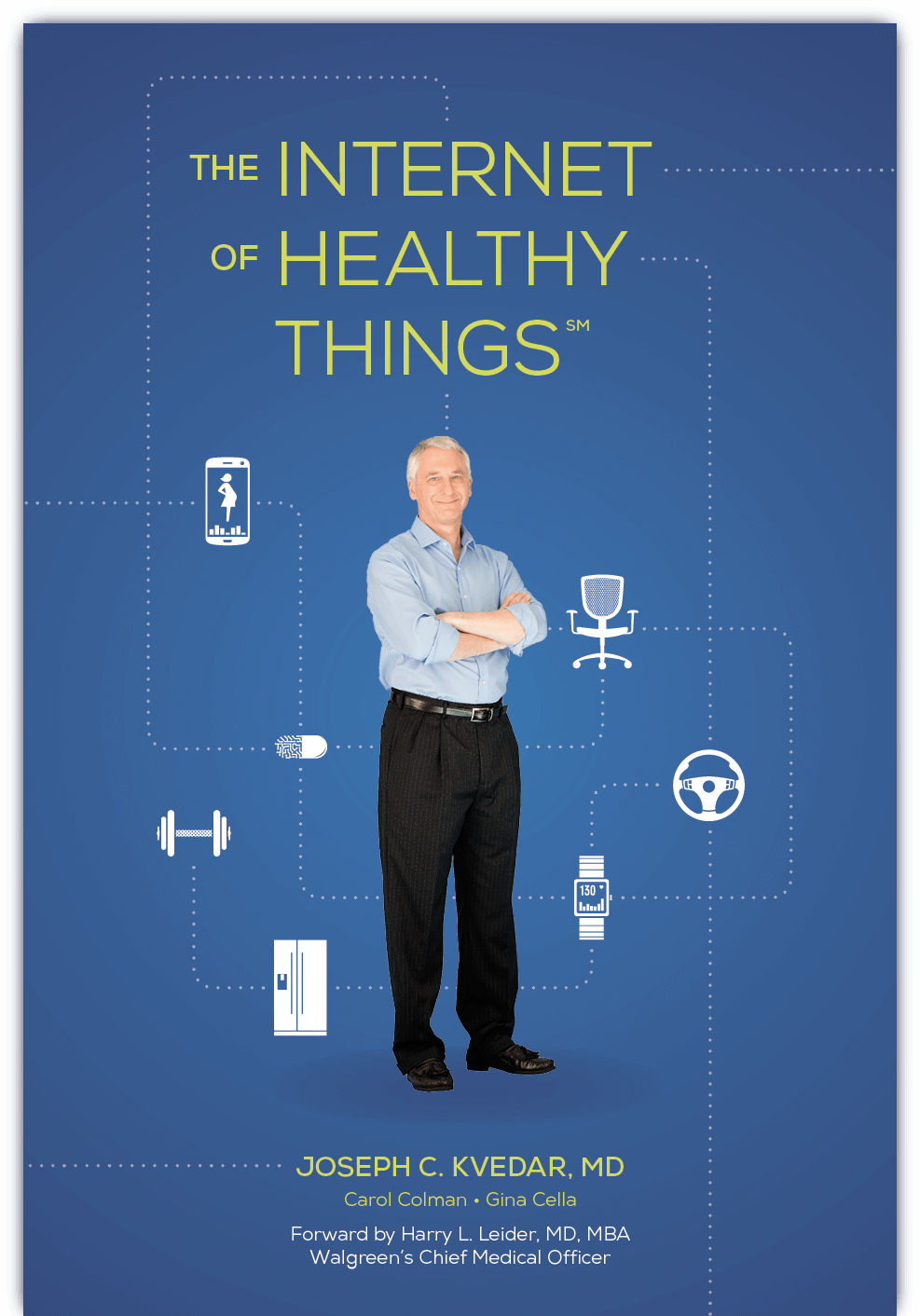The Internet of Healthy Things℠

Seeing Around Corners
Connecting to the IoHT presents a huge opportunity for all sectors of business and society, including payers, providers, pharma and biotech companies, and technology vendors , as well as newcomers to the space with fresh, creative ideas. This book shares Dr. Kvedar’s observations as a 20-year veteran in the field, as well as:
- Insights on consumer behavior, outlining the strategies and programs that can apply to the coming IoHT, while anticipating future trends
- Highlights ways to design personal health devices and platforms that make the health consumer experience more compelling and addictive
- Reviews new and potential applications of the many different (and novel) form factors that can be used for connecting health information to consumers Offers strategic advice for startups and entrepreneurs to the connected health market
- Offers strategic advice for startups and entrepreneurs to the connected health market
- Includes interviews with top industry leaders, healthcare providers, innovators and investors
- Foreword by Harry Leider, MD, MBA, Chief Medical Officer and Group Vice President, Walgreens
About the Book
Excerpt from Chapter 2
Who Can Play?
It’s not just the young and idealistic who are leaping into the health space: Companies like Apple, Google, Samsung, Microsoft, Philips, IBM, Intel and even the Ford Motor Company, to name just a few, are the superstars staking claim to the consumer health space. Health probably isn’t the first thing that comes to mind when you think of Samsung, yet this tech company’s recent investment in biopharmaceuticals and biosimilars (generic versions of biologics) has analysts predicting that it will soon dominate the generic drug market. How? By adding health and wellness programs that lead to better compliance and, presumably, strong consumer loyalty. To wit, Partners HealthCare signed a groundbreaking partnership agreement earlier this year with Samsung to develop personalized digital and mobile solutions for health and wellness, including software development and a clinical research program designed to deliver tools to improve chronic disease management. But it’s not just tech giants like Samsung that are linking to the Internet of Healthy Things. In the summer of 2014, ball boys at the U.S. Open tennis tournament wore form-fitting Ralph Lauren polo shirts that measured heart rate, as well as breathing and stress levels (ball girls’ shirts were still under development). The public was so taken with the concept that Ralph Lauren debuted its PoloTech shirt for men in August 2015. Powered by Montreal-based OM Signal, the shirt teams with an app to offer “live biometrics, adaptive workouts and more.” Also keeping up with the trend is fashion designer Tory Burch, who created a jewelry line for Fitbit in 2014 that promises to “transform your tracker into a super chic accessory for work or weekend.” Furthermore, sports apparel brand Under Armour’s purchase of diet app MyFitnessPal (with its 45 million active users) and personal training app Endomondo in February 2015 could turn this sportswear icon into a wellness juggernaut. Even Victoria’s Secret is now offering a sports bra with built-in electrodes that hook up to a heart rate monitor. And it’s not only the big brands who are leading the charge into health. The lower cost of starting an IT business, from inexpensive mobile app development to pay-as-you-go cloud computing, is opening the door to disruptive newcomers and their investors. According to Rock Health, a digital health accelerator, 2014 was a banner year for connected health startups. The $2.3 billion raised in just the first quarter was more than the entire amount raised in all of 2013. And, in the first half of 2015, digital health is showing no signs of slowing down, bringing in $2.1 billion in funding, just short of the 2014 numbers. Rock Health also notes that the average deal size in 2015 was over $15 million, exceeding 2014’s $14.6 million mark.
Connected Health Takes Off
When Partners HealthCare first started developing technology-driven care delivery, the mobile health market was nonexistent. Today, the growth projections for this relatively new industry are staggering. In 2012, the global market for mobile health was valued at $1.95 billion. Experts now predict it will reach $49 billion by 2020, with about one-third of revenues coming from the United States. (The wearable device market alone is poised to hit nearly $23 billion in 2015 and is projected to exceed $173 billion by 2020, according to a 2015 Research and Markets report.) But selling devices and apps is just a small piece of the connected health market. The data footprint created by people using them is a potential gold mine. Personal tracking data contains a treasure trove of information about how people live, work, play and even think, which sheds a great deal of light on their lifestyle, including their habits and preferences. This information is an invaluable tool to marketers and advertisers who want to sell stuff to people. But it is also an incredible resource for businesses, insurers, healthcare providers and entrepreneurs—even government health ministries—who need to better understand what motivates the health consumer. And they’re willing to pay big bucks to anyone who can find useful trends in the billions of data points collected every day. In 2014, an MIT Technology Review Business Report noted that, according to McKinsey & Company, there is a huge demand for platforms and services—a business the consulting firm values at $350 billion to $400 billion annually—that make this data both accessible and actionable to consumers.
Praise for The Internet of Healthy Things
Contact Us
Partners Connected Health 25 New Chardon St, 3rd Floor, Suite 300 Boston, MA 02114 Tel: 617-724-2724 Email: connectedhealth@partners.org Website: http://connectedhealth.partners.org/
Media Interviews
Gina Cella, Cella Communications Email: ginacella@comcast.net Tel: 857-239-9198
Speaking Requests
To book a lecture or speaking engagement, please contact Gina Cella at Email: ginacella@comcast.net

